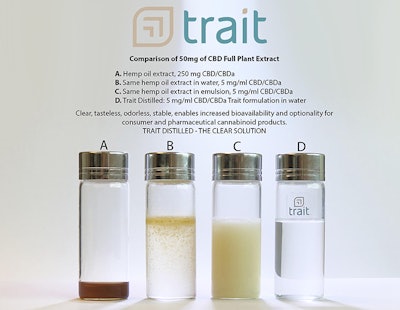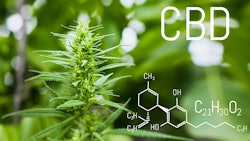
Trait Biosciences, a research laboratory focused on hemp and cannabis, has unveiled a suite of truly water-soluble cannabinoids that can be produced at commercial scale for the food, beverage and nutraceutical industries.
The technology, called Trait Distilled, involved more than two years of research by 45 scientists and researchers at the company’s facility in Los Alamos, N.M., according to Chief Strategy Officer Ronan Levy. Trait Distilled was formally announced at a forum of industry leaders in Half Moon Bay, Calif., over the weekend, and is now available in the form of a clear liquid and a powder that can instantly dissolve in water for the development of cannabinoid-infused beverages, edibles, nutraceuticals, and health and wellness products.
“Traditionally, until recently, cannabinoids have been introduced into edibles and beverages in rudimentary ways, whether that’s cannabis butter—which is putting cannabis in a slow cooker and having the cannabinoids extract into butter—or just using basic oils and trying to incorporate them into beverages [that] you have to shake up or something along those lines,” Levy said.
More recently, as the cannabis industry has grown in sophistication, cannabinoids have been incorporated into products using nanoencapsulation, with hydrophilic nanomolecules, he added. “So, putting the cannabinoids into something that sticks to water pretty well, so when you try to mix the fat-soluble cannabinoid—that cannabinoid in its oil format—into water, because it’s coated in something that’s hydrophilic, it sticks to the water better. When you shake it up, it stays integrated into the water better and longer than trying to mix your oil in, which separates like salad dressing.”
RELATED: How Water-Soluble Cannabinoids Could Change the Cannabis Beverage Market
Nanotechnology has helped improve products’ shelf stability by keeping the cannabinoids from separating, as well as helped produce clearer liquids, as opposed to cloudy liquids produced with traditional emulsification, Levy said. The use of nanotechnology has also improved cannabinoids’ bioavailability and onset time, as well as the taste and odor of cannabinoids, which are often grassy and don’t mix well into other flavors.
“The problem with nanotechnology is, because the nanoparticles are so small, they create a whole bunch of health risks,” Levy said. “These health risks have been recognized by a number of organizations, both governmental as well as business.”
Due to their small size, nanoparticles can cross the blood-brain barrier and potentially get into DNA, Levy said. The Canadian government has indicated that there is a causal relationship between nanoparticle exposure and adverse health effects because nanoparticles behave differently in the human body, he added.
“For these reasons and these risks, a lot of food companies have moved away from using nanoparticles in their foodstuffs just because it creates liability and health issues for those companies,” he said. “So, that’s the frame in which … Trait Distilled becomes particularly interesting.”
Rather than using nanoencapsulation or nanoemulsions in its technology, Trait uses glycosylation, a process that occurs naturally.
“It’s actually what our body does naturally when you ingest a cannabinoid, and that involves simply attaching a sugar molecule to the cannabinoid that makes it water-soluble,” Levy said. “When you put cannabinoids through the glycosylation process, it has no taste, no odor, and it’s completely shelf stable. It mixes into an edible perfectly through the process of osmosis. It’s uniformly distributed, and when you ingest it, it doesn’t affect the flavor. And because it’s water-soluble, your body is able to absorb it much earlier, so you have higher bioavailability and much earlier onset, which is what makes the technology so exciting.”
“[Glycosylation is] actually what our body does naturally when you ingest a cannabinoid, and that involves simply attaching a sugar molecule to the cannabinoid that makes it water-soluble."
-Ronan Levy, Chief Strategy Officer, Trait Biosciences
Trait Distilled can be applied to many areas of the industry, from cannabis edibles and beverages to pharmaceuticals, Levy said. “We can use this everywhere you look, from cannabis beverages—which have been the biggest focus of conversation because there’s so much interest around cannabis beverages and turning cannabis into an alcohol disruptor—to cannabis edibles [and] even pharmaceutical products, either direct pharmaceutical processes that go through FDA approval, such as wellness products, to anything that has higher bioavailability [but] that has no taste profile. … It can be used everywhere, and we’ve had conversations with the whole gamut of industry players who are looking at the cannabis industry and are interested in this technology.”
Currently, Trait Distilled is at what Levy calls medium-scale. The company can produce sufficient quantities to provide samples, and it is wrapping up toxicology studies to confirm its preliminary evidence, that the technology is non-toxic and safe to consume.
“We’re looking to partner with people who can do this on a large scale, whether that’s Big Alcohol or just people that specialize in fermentation, like some Big Agriculture companies who can take it throughout the existing infrastructure to do fermentation,” Levy said. “The process we use is essentially fermentation, but [we’re looking for] someone who could do fermentation on an industrial scale and create thousands and thousands of liters of glycosylated cannabinoids. That’s the path we’re looking at right now—just licensing the technology [and finding a] partner to scale it for us.”

The two-year journey to this milestone began with Dr. Richard Sayre, the company’s chief science officer, who set out to increase the yield of cannabinoids in hemp and cannabis.
“He thought about it for a while, and he realized that part of the reason that yields are pretty limited in most plants is because cannabinoids are actually, in some senses, toxic to the plant, and the plant only produces them in specialized cells—in the surface of the bud—and then exports them to the surface of the trichome, where the cannabinoids are stored,” Levy said. “And he realized that glycosylation, this process in nature that is often used to detoxify things, could be used to detoxify the creation of cannabinoids in plants, and by doing so, you can actually increase yield in hemp and cannabis significantly."
Once this discovery was made. Trait worked toward creating hemp and cannabis plants that naturally produce glycosylated cannabinoids, and therefore could create those cannabinoids everywhere in the plant.
“What we also realized is that you don’t actually have to do this in the plant because it’s a longer process to breed plants that have this capability,” Levy added. “You can actually take extracts—conventional extracts produced from natural plants …—and we could get yeast and other cells to actually do the glycosylation process after a traditional extraction process.”
The company has spent the last 18 months optimizing this process and ensuring it is efficient enough for companies to use it on a large scale.
“Now, the protocols are well-established. We understand how it works, so that’s why we’re able to move up to industrial scale and find partners who can implement these protocols,” Levy said. “It’s been a not short process, but it’s been a relatively smooth process where we were able to anticipate most of the challenges around it. … We brought in some of the world’s best fermentation experts to help us go from lab scale to the scale we’re at now and beyond.”
Trait has a license through the DEA that allows it to work with THC, as well, and the company is also studying glycosylated THC. In addition to this work and finding partners to help continue to scale Trait Distilled, the company also seeks to educate the industry, regulators and consumers about the potential concerns surrounding nanotechnology, so they can make more informed decisions.
“Especially in the U.S., it’s been a free-for-all with haphazard regulations state to state, and no direct oversight by many governmental authorities,” Levy said. “There are a lot of practices and a lot of products being produced that just haven’t been studied. I’m not going to say they’re necessarily dangerous, but people are using nanotechnologies in products and are putting it out for sale already, even though there are well-recognized health risks, just because the FDA didn’t have a mandate to regulate cannabinoids, but now does with CBD. … We just want people to be aware and make informed decisions and right now, no one is having these conversations, so we’re trying to lead that conversation."
























